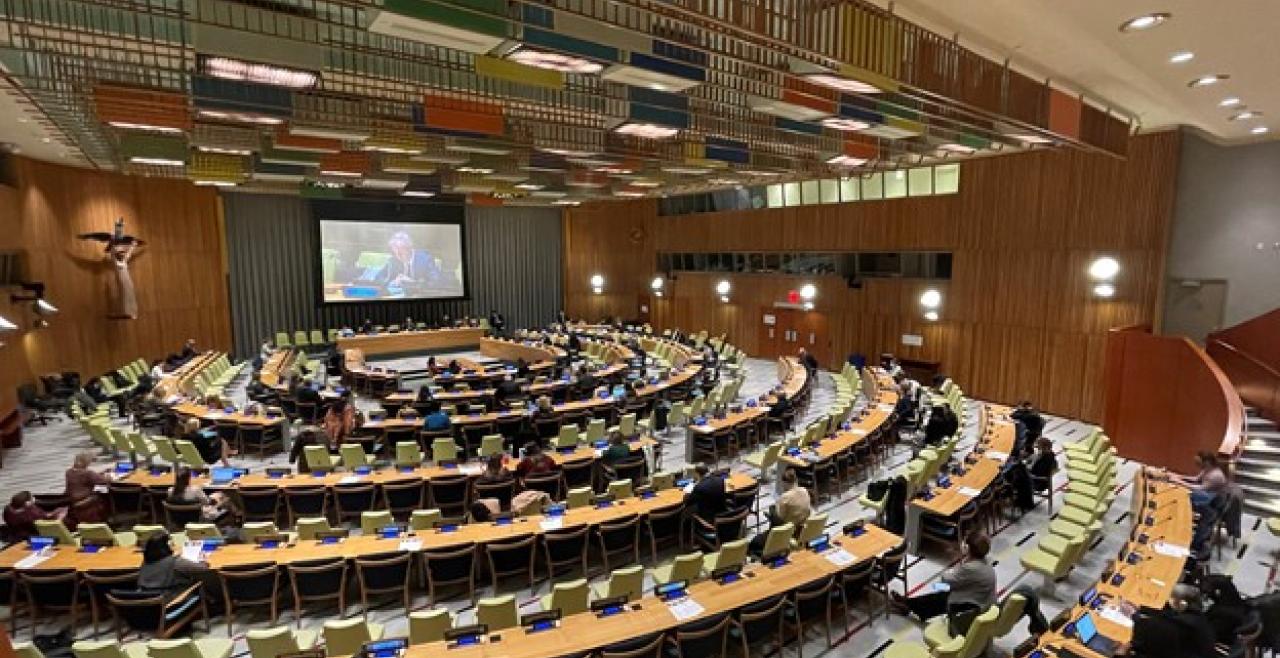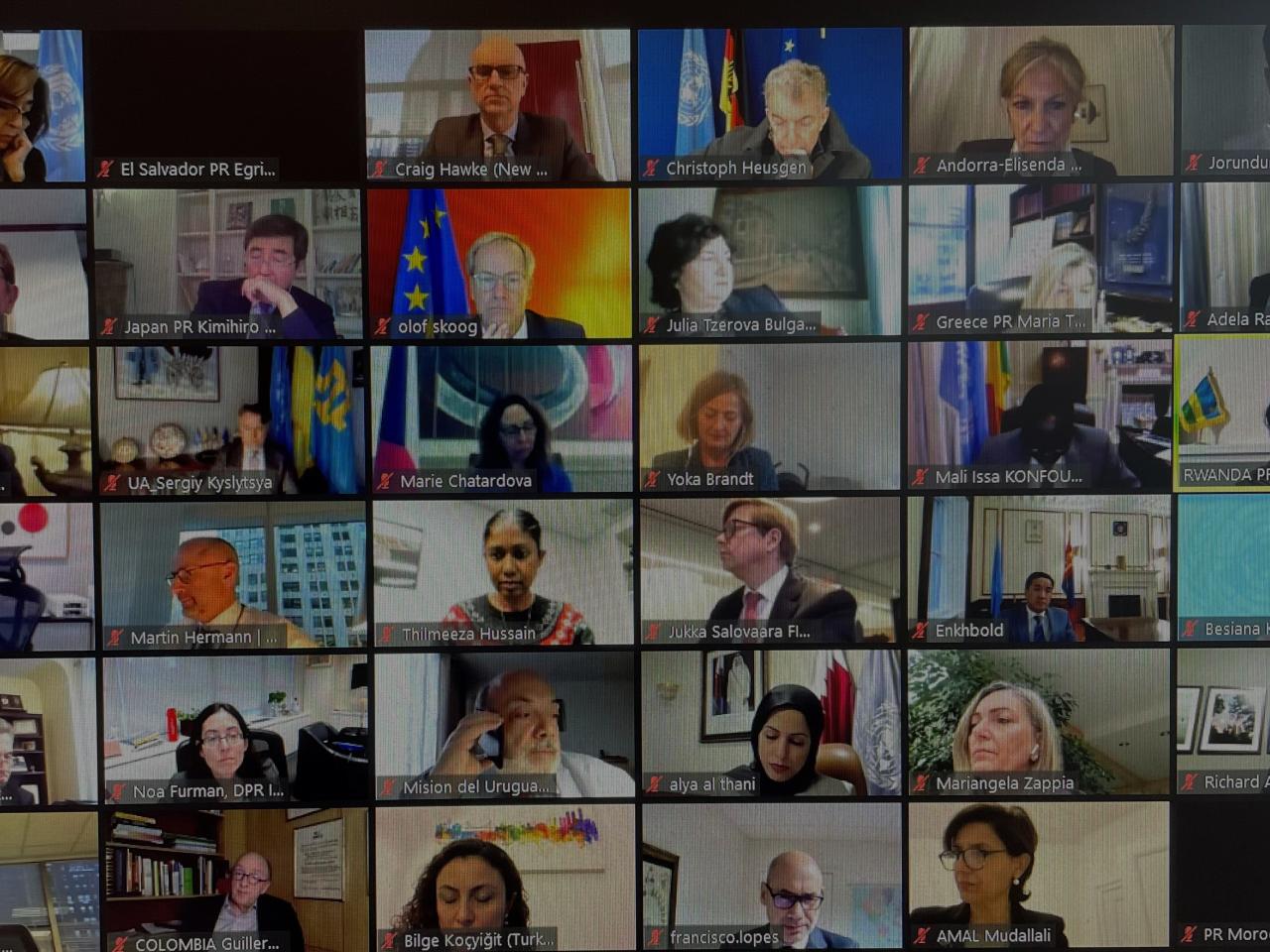Group of Friends for the Elimination of Violence against Women and Girls marks one-year anniversary

NEW YORK, United States - On 2 December, the Group of Friends for the Elimination of Violence against Women and Girls held its one-year anniversary event, the first in-person meeting since the group’s formation in 2020. The aim of the group is to coordinate action and share information on the elimination of gender-based violence (GBV), and to follow up on the UN Secretary-General’s calls for action on the issue.
The event focused on gender-based violence and women's economic empowerment, and was moderated by European Union (EU) Ambassador to the United Nations (UN) Olof Skoog. The panel included Deputy Executive Director of UN Women Åsa Regnér, Head of the Spotlight Initiative Technical Unit Erin Kenny, Senior Gender-Based Violence and Development Specialist at the World Bank Diana Arango and Chair at the NGO Committee on the Status of Women Houry Geudelekian.
“Our group was established a year ago in response to the horrifying impact of the COVID-19 pandemic on all forms of gender-based violence." - EU Ambassador to the UN Olof Skoog
“Our group was established a year ago in response to the horrifying impact of the COVID-19 pandemic on all forms of gender-based violence and the UN Secretary-General’s global appeals to end violence, including in homes,” said EU Ambassador to the UN Olof Skoog. “The group has since grown to 93 members from all regions, and it keeps growing.” He welcomed Timor-Leste as the ninety-fourth member.
He said that the feminization of poverty, gender-biased access to finance and women’s unpaid care burdens directly impacted women’s vulnerability to violence, making the subject of the event a timely one.
His concerns were echoed by Deputy Executive Director of UN Women Åsa Regnér, who said that a rapid gender assessment in 13 countries to better understand the impact of COVID-19 on violence against women and girls revealed that violence levels had stayed high [since the pandemic began]. “One in two women said that they had experienced violence during the covid period.”
“We know that this violence is not inevitable… and we have evidence and knowledge about what to do if we want to prevent it,” she said. “Spotlight has shown us that with large, targetted investments, national governments are also stepping up to allocate budgets to sustain the efforts to end violence against women and girls. This is very positive.” At the same time, she urged members to commit the necessary resources and structures to ensure that verbal commitments to ending violence were transformed into concrete action.
Head of the Spotlight Initiative Technical Unit Erin Kenny said that the spike in violence against women and girls during the pandemic had had laid bare the fact that progress to end gender-based violence had been woefully insufficient. However, “In 2020, the Spotlight Initiative sought to present a different narrative. Six hundred and fifty thousand women and girls were provided with gender-based violence services despite COVID-19 related constraints and lockdowns. Eight hundred and eighty thousand men and boys were educated on positive masculinity, respectful family relationships and non-violent conflict resolution and parenting.”
"650,000 women and girls were provided with gender-based violence services despite COVID-19 related constraints and lockdowns." - Head of the Spotlight Initiative Technical Unit Erin Kenny
Additionally, 84 laws and policies had been signed or strengthened across 17 countries and more than 1000 civil society, grassroots and women’s organizations reported having greater influence and agency to inform these policies at all levels, among other encouraging results.
She said that the Spotlight Initiative was already working on women’s economic empowerment by supporting the unionisation of women migrant workers across the ASEAN region, gender-sensitive budgeting in government ministries, and village savings and loans programmes, but would be focusing more closely on economic solutions in new and continuing programmes.
“Women’s economic empowerment is fundamental to addressing violence against women and girls,” said Senior Gender-Based Violence and Development Specialist at the World Bank Diana Arango. She said that studies found that “having a job during the pandemic was one of the strongest protective factors against exacerbated risks of violence during COVID-19.”
"We [the World Bank] are committed to continue our work to end violence against women and girls. We are grateful to be able to build on the hard work of UN agencies and CSOs that have been working for decades on this agenda.”
Speaking on behalf of more than 40,000 global civil society members, Chair at the NGO Committee on the Status of Women Houry Geudelekian said that “we are so grateful for the Group of Friends’ commitments in December 2020 to recognize and collaborate on eradicating all forms of violence.”
“The mechanisms [to address violence] are there - we need to use them. We must also go beyond talking and agreements. The Spotlight Initiative is a perfect example of how you bring action and see results.”


